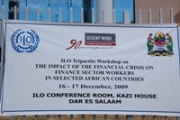Social dialogue is key to address financial crisis in Africa

The African finance industry has been largely unaffected by the global financial crisis (GFC), as yet. However the economic affects of the crisis have begun to spread across the continent and are expected to escalate. The participating organisations decided to engage more strategically in regular social dialogue to develop coping mechanisms to address the affects of the GFC.
Indicators lead us to believe that social and economic problems in the continent are fast approaching for the financial sector and others. These indicators include a decline in remittances by African nationals sending money home, decline in demand for commodities by other nations, increased need for aid, decreased demand for financial services and decreased direct foreign investment by private operations on the continent. The tripartite workshop agreed that time was on their side and lessons could be learned from other nations. The group decided that all efforts should go towards serious engagement at national level to begin to find solutions to potential problems for the financial sector.
GFC oversight committees had been established in some countries and it was recommended that the sector has the opportunity to feed into these groups.
The group concluded that successful social dialogue to address the financial crisis at national level in the financial sector should include:
- Social partners with the capacity to successfully and legitimately engage in constructive, regular and committed dialogue.
- Bank and financial regulation and supervision.
- Issues of corporate governance.
- Accountability and delivery on stimulus package measures. Socially responsible allocation agreed to between social partners. Stimulus should lead to sustainable job creation, infrastructure development, social security, health care and education.
- Responsible sales and advice of banking products.
- Contractual obligations made to workers to be respected in times of crisis.
- Compulsory consultation with tripartite bodies prior to retrenchments which should be considered as a last resort.
- Schemes for training and retraining of retrenched workers.
- Support mechanisms for workers to deal with work load pressure and personal financial pressures and social protection.
- Debt advisory services for business.
The ILO agreed to support its constituents with the necessary tools, training, monitoring and research. This will include promotion of commitments made by worker, employer and governments in relation to the GFC.

